By Kelly Galfand, JOY IN YOUR SPACE, 610-896-6896
My role as organizer usually involves helping people:
• live with less
• have more within easy reach
• love what they store.
One popular area I organize is wardrobe closets. Sometimes I’m hired to fix a physical problem; I solve storage challenges. Sometimes I am the necessary support as someone decides:
• what to keep
• where to donate or sell
• how to let clothes go.
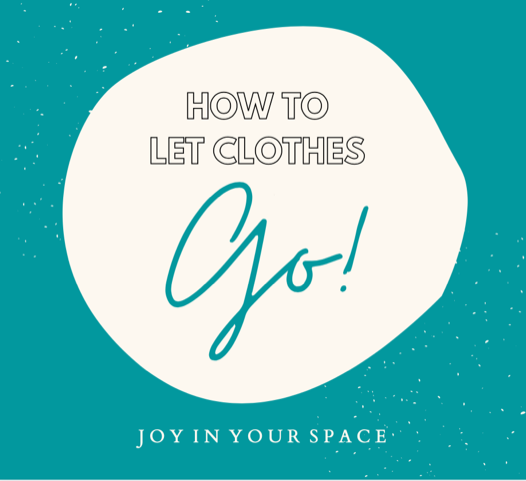
In my experience, even when someone commits to trimming their wardrobe, there is one item they want to get rid of but (in their words) “can’t!” In these situations, what’s really behind their “can’t” is guilt.
When I hear a closet client say “I can’t get rid of this,” I know the clothing in question was either expensive, a gift, or it holds sentimental value.
• If the item was expensive… and they haven’t worn it (ever or enough), the struggle is about throwing good money away. But honestly, they’re wasting more money by storing this item. Waiting too long to resell something is not smart; the resale market pays more for recent purchases.
• Check out resale avenues like TheRealReal, PoshMark, Clothes Mentor, Plato’s Closet, and ThredUp depending on the item’s value.
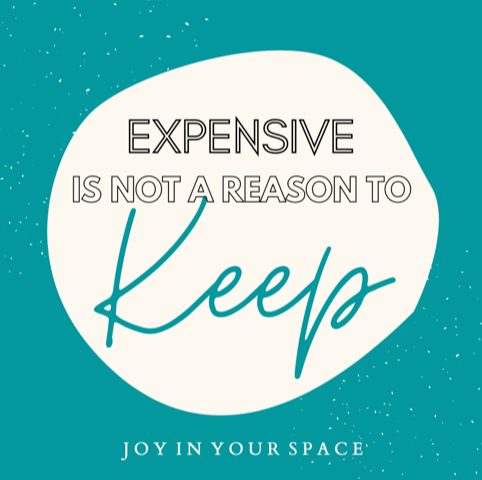
• If the item was a gift… from someone they love, their love for the person is getting in the way of their ability to decide what they want in their life. They sometimes think that letting the item go is akin to rejecting the gift-giver’s love, kindness, or generosity. Trust me, your favorite aunt knows you love her even if you don’t love the winter hat she gave you. I always reassure clients that no one gives a gift in order to burden the recipient. A recipient’s only responsibility is to be gracious in accepting the gift.
• —You can always donate the item or its value to a charitable organization the gift-giver supports to lessen the pain of letting the item go from your life. Let it be a gift that keeps on giving — to someone else!

• If the item holds memories it will fall into one of two categories:
• Clothing from the person’s own life (even if it was someone else’s at some point)
When I come across these sentimental clothes, the first question I ask is: Will you still wear it? If the answer is “yes,” it can stay.
If the answer is “no,” then I suggest the t-shirt, wedding gown, or cheerleading skirt move to a spot more suitable to memories and nostalgia.
• Clothing that holds memories may have belonged to a deceased loved one. I help people navigate these sensitive areas often. What I counsel, is to keep only the sweatshirts, t-shirts, or hats that meant something to the departed and mean something still to you if you have room for it.
If it’s something you aren’t going to wear, display it to honor it in some way. Shadow boxes are wonderful conversation pieces and visual reminders of our ancestors’ legacies.
To me, your adored Uncle’s memory does not hinge on a single t-shirt…not even on his entire t-shirt collection. I recommend that if you let items go from your life (that belonged to someone you loved) decide how you will remember this person (in thought or deed) once you let the item go. Then be intentional in keeping their memory alive.
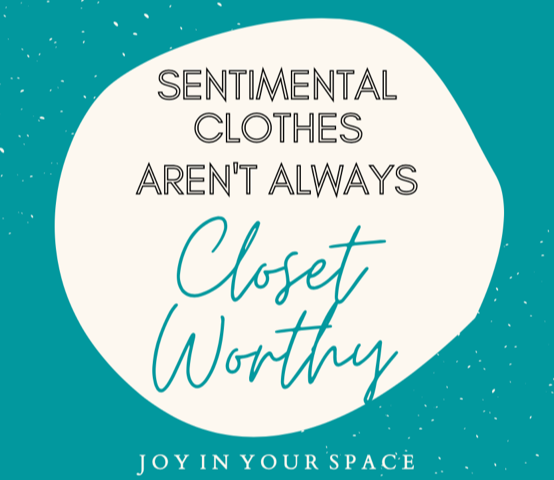
Day 365 + ???? (who’s counting) of the pandemic and it seems like everyone is decluttering. We’re all trying to hold true to our reoccurring New Year’s Resolution to ”Get Organized.” Getting Organized can mean different things to us but it usually involves some sorting and culling of categories of stuff.
In our experience, there are always 3 decision buckets your stuff will fall into:
Our NAPO colleague, Barbara Hemphill, coined this brilliant definition: Clutter is Postponed Decisions.™ Clutter builds when we postpone decisions about:
• Do I really love it?
• Will I use it?
• Does it fill a void in my life?
• If I’m keeping it, where should it live?
While you do need to decide about your stuff, you do NOT want to stop the decluttering process to ponder each individual item.
Our time-saving advice is DEFER your decision for the “maybes” and “I don’t knows.”
These tricky decisions deserve attention — but NOT while you’re in the initial stages of rapid-fire, gut reactions to your stuff.
If you stop your intuitive process of deciding Yes, No, Maybe you won’t get through the whole category of stuff and you won’t see visible signs of progress. This will feel depressing and probably halt the whole decluttering process.
Follow our advice and schedule time with yourself — on a separate day — when your mind is fresh and you’ll taste sweet success. Technically, it’s called time chunking. In practice:
• One organizing session is dedicated to quick, visceral decisions.
• Another for contemplative, thoughtful and reasoned thinking.
Permission granted to defer your decisions on all of your “maybes” and “I don’t knows” — not because pushing off until tomorrow is a winning strategy. Permission granted because setting aside the necessary time to consider what deserves a place and space in your life is worthy of your full attention. In this case, deferring the decision is a smart move.
Between The Home Edit and Marie Kondo, everyone wants to tidy up. Coupled with sheltering-in and working from home for months, the desire to live with less and deal with our messes has grown.

Thanksgiving and the approach of more holidays add incentive to put our homes in order. “Getting organized” has become a need, not a dream.
For those who want the expertise, guidance, and support of a professional organizer, hands on help is still available. If in-person organizing doesn’t work for you, virtual organizing is an option worth considering.
Virtual Organizing is not new…
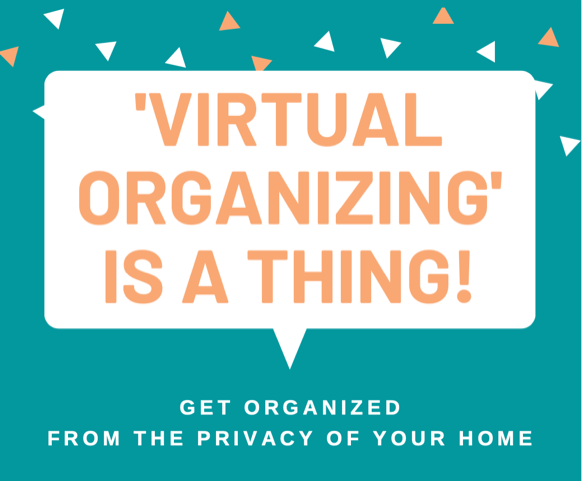
• Over ten years ago, Sheila Delson, co-founder of The Institute for Chronic Disorganization, coined the term Virtual Organizing (V.O.). She has since educated experienced organizers in the best practices and most successful methods for V.O.
In years past, V.O. had been limited by familiarity with zoom and other remote options. With so many adjusting to zoom school, virtual offices and FaceTime meetings, that tech barrier is (virtually) gone making V.O. much more accessible.
Obvious benefits of working virtually:
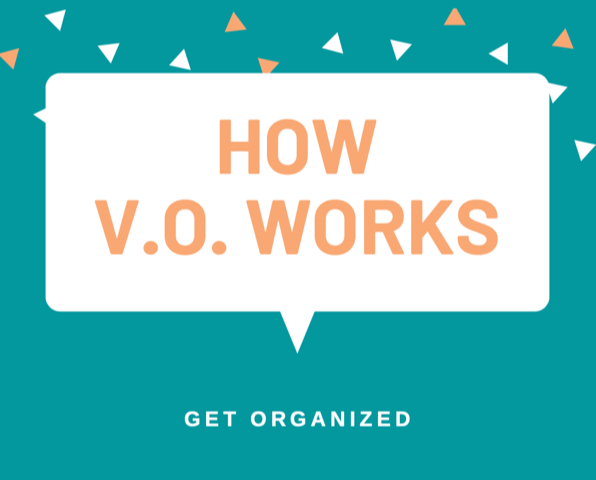
• Guidance on where to start
• Expert clarity for steps involved
• During this pandemic: it is a no-risk option for working together
Five bonus benefits of working remotely:
• Accountability so you’ll follow-through on each step
• Access to resources and connections only your NAPO organizer can provide
• Control over what your organizer sees…or doesn’t 🙂
This may make it easier to focus on a discreet project before you’re ready to open yourself up to a whole room or house re-org.
• Affordability V.O. sessions are typically shorter (1 – 2 hours long) than in-person appointments (which could be half or whole day commitments)
• Any progress you make will be 100% YOURS to claim
If you already have experience working in-person with an organizer, transitioning to a virtual partnership puts the emphasis on what you can do. That’s empowering!
Virtual options aren’t limited to a geographic location.
That said, there are benefits to working with someone local:
• When working with a local organizer, your organizing work can be virtual. Even so, you can still benefit from having your organizer collect items or run some errands, if they handle donations or resale of items.• In the future: post-pandemic, once you’re more comfortable, or when the scope of your project changes, you’d have the option to invite your local organizer in for hands-on organizing. It’s all about choices!
While sheltering-in-place we’ve been spending a lot more time baking. And wouldn’t you know: Stressed Spelled Backwards is: Desserts!

I saw that catchy phrase after delivering my 5th batch of muffins in April. To avoid gaining the dreaded Covid-15 (think Freshman-15) I delivered Tupperwares to my neighbor, who appreciates my zero-sugar recipes.
With my last delivery of cranberry-sweetened pumpkin millet muffins, I wrote “sorry for dumping my stress-baked goodies on your doorstep.” She texted back “TY” with a link to “Stress-baking is a real thing!”
My 3 favorite therapeutic benefits to baking:
This “proof of progress” is where I want to focus.
I don’t know about you, but I am:
• losing a sense of what day it is
• not as productive as I was before Covid-19
• feeling less accomplished despite feeling almost as busy
So I reflected on the tools I used before Covid-19:
Here’s why I’m returning to these habits:

I can’t take credit for figuring out…stressed spelled backwards is desserts!
As an organizer, I always follow my client’s lead and only suggest we work on areas THEY identify. Every once in a while, though, I notice an irritating situation that could easily be solved with a label.
This scenario came up a month ago while working in someone’s dressing area: her space has a number of zones with specific task lighting tied to a central panel.
As we were leaving the space, she went to turn off her make-up area light. Not knowing which switch controlled which light, she ended up flicking every switch, one by one, until she found the ONE she needed. Her heavy sigh told me this issue is chronic.
So we fixed her problem — right then and there.
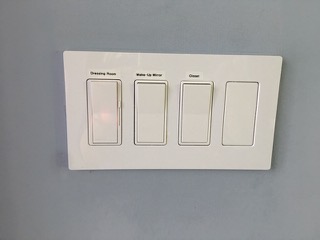
Now, if you know the story of the cobbler whose kids went barefoot, you will understand that just because I see “problem areas” in other people’s homes all day, this does not guarantee that I am a ruthless problem-solver in my own home.
Spoiler alert: not every shelf, bin or basket in my home is labeled!
Truth is, not every shelf, basket or bin NEEDS to be labeled. If it is obvious what it is and if no one is having an issue finding what they need, then there is no problem. But confusion breeds stress.
That same day, I went home and noticed myself doing the same thing to two of our three kitchen switches. That’s when I decided to do for myself what I do for others! So I labeled our switchplate. It’s been a game changer. The only thing I had to tweak was what I called them; my daughter did not think “door” made sense so we revised the label and now everyone is happy.
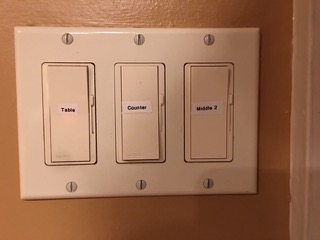
Our kitchen is the hub of our home, but now that the weather is warmer, we are spending a lot more time on our front porch.
Fast forward to the other day, when my husband texted me to make sure I turned off the front pathway lights. Our guests had stayed late the night before, and he didn’t want to waste electricity. In the daylight, I could not see if the lights were on or off… Couple that confusion with another multi-switch panel, and my stress level was rising. Without a partner to check the outdoor fixture’s bulb, it was more exercise than I expected so early in the morning. I figured it out on my own, turned the pathway lights off and did what any organized person would do: I labeled each switch.
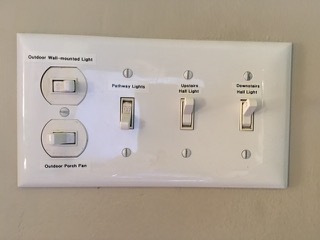
This time, my family approved of every label AND my daughter commented the next morning how helpful it was to know which switch controlled which hallway light. She had stayed up later than all — not unusual for teenagers — and knowing that we sleep with our door open at night to give our dog freedom, she didn’t want to wake us with a bright light at the top of the stairs.
My labels helped protect my investment of time, saved our daughter from waking us, and granted me an uninterrupted night’s sleep!
Think of where a label or two could help your household function a little better or brighter, or maybe even ensure a better night’s sleep for you.
Banish household confusion with a label or two; it’s illuminating!
If you’ve ever wondered, do organizers really practice what they preach?
I am here to say, YES! In my case, I follow 4 basic rules*:
1. Decide where things live
2. Return items to their “home”
3. Follow In One/Out One
4. Build routines around maintaining systems
 The third rule, In One/Out One, is the least appreciated and most neglected by our clients, even though it offers the best defense against clutter build-up.
The third rule, In One/Out One, is the least appreciated and most neglected by our clients, even though it offers the best defense against clutter build-up.
Here’s a personal story of how it recently went down in my house.
First you have to know that I LOVE citrus. Fresh lemon juice goes into every salad dressing. Fresh lime juice refreshes most fruit bowls. Many of my fish recipes require fresh lemon, lime or orange juice. So my juicer has been a staple in my kitchen. I love that it not only does a great job, it also attaches to a measuring cup – which makes it easy to know when I have enough.
Pictured below on the left, it had a primo spot in my most accessible gadget drawer just below my prep counter. Until…
 My husband, an aspiring minimalist, bought me a new juicer. He had researched to get me “the perfect gift.” I was skeptical, even though for him to buy something it MUST be great. I could not imagine HOW anything could replace my beloved juicer.
My husband, an aspiring minimalist, bought me a new juicer. He had researched to get me “the perfect gift.” I was skeptical, even though for him to buy something it MUST be great. I could not imagine HOW anything could replace my beloved juicer.
It would have to at least be:
• super easy to use
• simpler to clean
Well, my new citrus press is all that AND bold and bright. In being so colorful — I smile every time I see it.
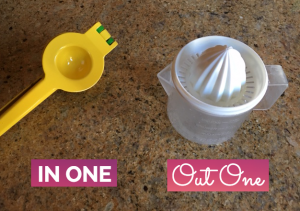 But it took me some time to let go of my trusted fave…2 weeks, in fact. I call it the testing time. Some “old” items deserve this reflective time.
But it took me some time to let go of my trusted fave…2 weeks, in fact. I call it the testing time. Some “old” items deserve this reflective time.
Honestly, it took me a week to open the package and try the new “citrus press.” I felt like I was cheating on my trusted go-to.
Once, I tried it, I set an alarm on my calendar to remind me to “consider if keeping new juicer” and a few days later “decide if still need old juicer.”
When you replace something, even if you are committed to In One Out One, you don’t HAVE to let go immediately. But you must put a time limit on making your decision. (It’s too easy for items to stagnate, clog your drawers and attract more clutter.)
Since I was using these gadgets daily, it didn’t take long to know I was in love. As for my “old” juicer, it still has life left in it. My son is a decent cook at college — so guess who just inherited a new fave? 🙂 When he graduates, I will gift him his very own citrus press!
* Remember I said these were 4 rules that I think every Professional Organizer follows?
It’s true of any organized person.
• You don’t have to be a professional organizer to be organized.
• Some people are MORE organized than their organizer (GASP!)
Yes…it’s true. Not every organizer is the MOST organized person you’ll ever meet.
• Professional Organizers know how to help YOU solve your organizational overwhelms and clutter-crisis.